PR Crisis. The two words no business owner ever wants to hear. Building a positive brand reputation takes years of hard work and dedication.
Yet in today’s digital age, it can take just mere minutes for a brands reputation to be tarnished in full view of the whole world. So, it’s understandable that anything threatening to jeopardise your brand reputation is considered a “crisis”.
How you choose to respond to the PR crisis can either make or break your brand. Thankfully, if done correctly, social media can help your brand climb out of the hole it has dug for itself. With the help of social media, you will be able to diffuse the situation, allowing the PR crisis to pass quickly.
How Can Social Media Help In A PR Crisis?
There are three key ways in which social media can help your brand if you happen to stumble into a PR crisis.
Understanding The Public Response To The Crisis
First, your brand can use social media to monitor the response to the crisis as it is playing out. Your audience will be expecting a response very quickly. But don’t make any rash decisions until you are aware of the big picture.
Your team should use social media to gain an understanding of how your audience is reacting to the crisis. This includes customers, competitors, influencers, the press and review sites.
Responding To The Crisis
The second way in which social media can help your brand through a PR crisis is the most important. You can use social media to publish a response to the PR crisis.
Your brand can directly communicate with your audience and keep them updated on how you are handling the crisis. If this is done correctly, with honesty and integrity, you can swiftly minimise the impact of the PR disaster.
Social media allows your brand to control the narrative. Your brand has a voice and social media provides a platform for you to use it. Through social media, your brand can get to work on putting out the fire, before people have the chance to throw more fuel on it.
Monitoring The Crisis
Finally, your brand can use social media to talk to your audience and answer queries they may have. Following the PR crisis and the release of your brand statement, there will likely be a lot of buzz around your brand. Your audience will have questions they’d like you to answer and statements they’d like you to acknowledge.
The best way for your brand to deal with these questions and queries is to have a genuine presence. Your social media team should create open, honest and consistent replies that convey the brand messaging.
Do not delete negative comments or questions about your brand. Someone will have screenshotted it long before you have a chance to delete it. And deleting it will lead to further problems for your brand.
Instead, provide a human response to the comments, whether they are good or bad. This will demonstrate that your brand is taking responsibility for its actions.
Tips For Using Social Media To Deal With A PR Crisis
Here are our top tips for using social media to responding to a PR crisis.
- Communicate with your team effectively. Whether your social media is carried out in-house or outsourced, you need to be communicating with your whole team to ensure everyone is on the same page. If you use influencers for your brand, you should also communicate with them about how/if they should respond to the situation.
- Take responsibility and apologise. You may also want to launch an investigation if required. You only have to look back at past PR crisis’ to see that taking responsibility and apologising for your mistakes is always the best option. If your brand is open and honest about the mistakes, and promises to do better in the future, you may be able to limit the damage of the PR crisis quickly and effectively.
- If social media posts are scheduled in, review, pause or even clear the content calendar to avoid posts going out that are insensitive to the PR crisis. It is likely that following the PR crisis, your scheduled social media posts are no longer relevant or of high priority. Also, check and pause any social media ads.
- Take a step back to evaluate the situation and give yourself time to create a calm response to the situation. Making a rash decision and publishing an emotion-fuelled post can make things far worse for your company.
- Ensure the message you are sending out is consistent across all social media channels, particularly Facebook, Twitter and LinkedIn. You may also need to update the content on the homepage of your website to ensure it is in line with the messaging you are putting out on social media.
- Don’t make promises that you cannot keep. This one is important. If your statement promises an investigation into the problem that has stirred the PR crisis, you must follow through with this promise. Your audience will be expecting updates and are likely to call you out if they don’t see positive changes.
- When releasing a statement or responding to audience queries, only cite credible, fact-checked sources.
- Ensure social media management is carried out by the professionals. You need to trust the skills and experience of your social media team or social media agency and take their opinion on board when responding to a PR crisis.
- Remind your audience of your brand’s positive track record and highlight that this type of situation (whatever it may be) is unusual for your brand.
Aside from your social media channels, your team should also prioritise reputation management throughout your other digital marketing efforts, including email marketing, SEO and online review sites.

